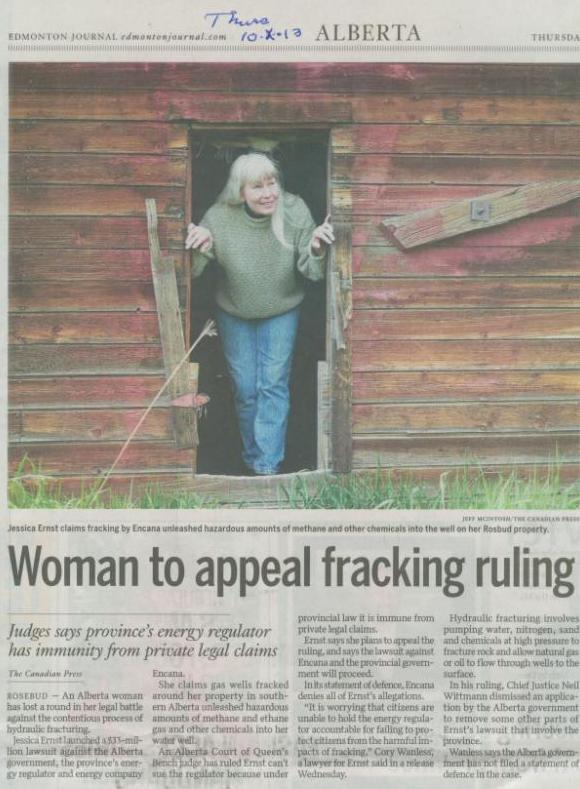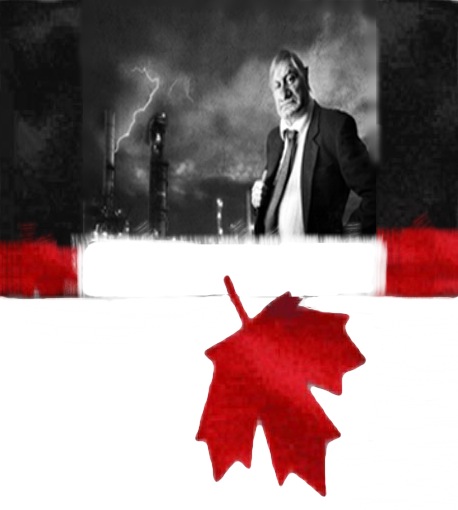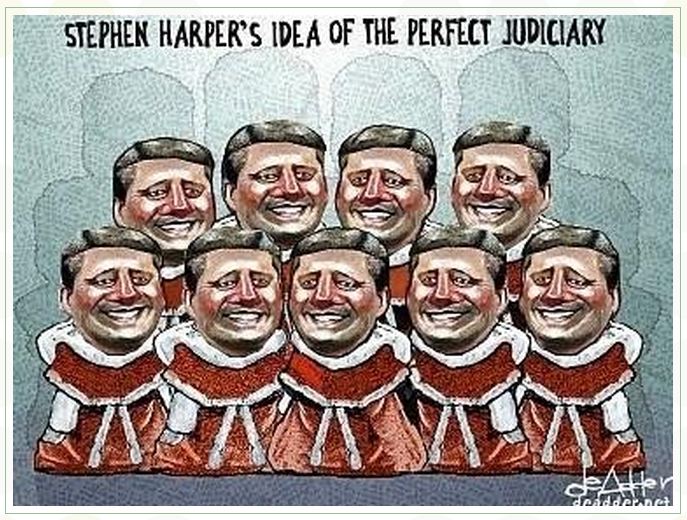Gaz de houille – Jessica Ernst va en appel Translation of Andrew Nikiforuk’s article below by Amie du Richelieu (with note: It’s Thanksgiving, after all…), October 13, 2013
Alberta Energy Regulator Given Immunity in Landmark Fracking Suit, ‘I have no choice but to appeal’, says plaintiff Jessica Ernst, who alleges industry polluted her water by Andrew Nikiforuk, October 9, 2013, TheTyee.ca
Ernst, who launched her lawsuit in 2007, told The Tyee that she would appeal the decision.
“I have no choice but to appeal,” said Ernst in an interview. “Chief Justice Wittmann ruled that the ERCB has a duty to protect the public, but not me. I am the public; we all are. Without water to bathe in, the public’s well-being declines — as mine has for years. Without water to drink, the public dies, so do all individuals — including Justice Wittmann and his loved ones. There is no frack worth that.
“If I let these rulings stand, companies and the Canadian Association of Petroleum Producers will push regulators across Canada to do unto others as the ERCB did unto me, when they breached my Charter rights and tried to intimidate me into silence by judging me a criminal without any evidence or trial.”
Regulator has ‘total and blanket’ immunity’: lawyer
Ernst said a Cochrane-area family phoned her two days ago with a case of water contamination and livestock poisoning due to fracking for shale oil in the Cardium formation. Ernst was told that if they publicly complained, industry threatened to no longer deliver water to their home. “It’s another horrendous case,” said Ernst. …
(Ranchers say that Alberta Environment now has so many complaints about hydraulic fracturing from landowners in southern Alberta’s foothills that it is completely backlogged.) …
Encana, which has suffered financial losses due to bad investments in shale gas, never asked for any part of the claim to be struck. The company’s statement of defense was filed last month, six years after Ernst launched her lawsuit. [Emphasis added]
An environmental scientist from Alberta by Julie Ali (Edmonton Mum and poet), October 10, 2013, Reading Children’s Books
Why are there no folks in the legal community commenting on the decision by this judge? Why are there no lawyers indicating that the legislation that allows the AER to walk over our constitutional rights is in fact–unconstitutional? …
When will you all see that this is about democracy?
And what will we do when our aquifers are contaminated?
Heck they may already be contaminated. Where are the water testing results?
The regulator has immunity by Julie Ali (Edmonton Mum and poet) , October 10, 2013, Reading Children’s Books
here is the road where the signs are mysterious
you are to move forward
for looking back
will cost you
what you have gained
keep going
is the only refrain
should you hurt
about the scars
that were given to you
by the government
(the people we trusted
with our children)
do not fret
these are scars
that are to be shown
as evidence
of the negligence
of the Tories
and their oil industry buddies
these adhesions
will not endure
they will be cut
by us
do not fret
the future is coming fast
you are simply to keep the faith
we believe in you Jessica
and should you falter
lean hard
on us
because we believe
in you
we no longer believe
in the Tories
at all levels
and we understand
that they have dismissed this case
because the evidence is present
for your case
we see the proof of the corruption
of the judicial system
for we have the evidence
that the water was pure
before they came
to frack Rosebud, Alberta
and so how
will they explain
burning water
after the fracking
was done by EnCana?
how did the gas come
to Rosebud wells
without the help of EnCana?
more importantly
we should ask these questions:
why does the government of Alberta
not protect the children?
why are there no consequences
for the government’s regulatory agency
for harming the citizens?
why do they operate
as above the law of the land?
do we live in China
or Nigeria in Canada?
are we ruled by bitumen masters?
are we then bitumen slaves to be damaged
as they will?
and if so
when will this all end?
here is the road
we are to walk (not run) each day
we are to take each step
carefully
as if the road was mined
(which it is)
and holding hands
with us — Jessica
you are to keep going
we are watching them
Woman to appeal fracking judgement that ERCB (AER) – a provincial regulator – can violate constitutional rights of Canadians with total immunity by Canadian Press, October 10, 2013, Edmonton Journal
Regulator has legal immunity by The Canadian Press, October 10, 2013, Calgary Herald
Alberta court protects regulator from Ernst’s fracking lawsuit by Canadian Press, October 9, 2013, Common Sense Canadian
Jessica Ernst can’t sue Alberta’s energy regulator, rules Calgary judge by The Canadian Press, October 9, 2013, CBC News
An Alberta Court of Queen’s Bench judge has ruled Ernst can’t sue the regulator because under provincial law it is immune from private legal claims. Ernst says she plans to appeal the ruling, and says the lawsuit against Encana and the provincial government will proceed. In its statement of defence, Encana denies all of Ernst’s allegations.
An Alberta Court of Queen’s Bench judge has ruled Ernst can’t sue the regulator because under provincial law it is immune from private legal claims. Ernst says she plans to appeal the ruling, and says the lawsuit against Encana and the provincial government will proceed. In its statement of defence, Encana denies all of Ernst’s allegations.
“It is worrying that citizens are unable to hold the energy regulator accountable for failing to protect citizens from the harmful impacts of fracking,” Cory Wanless, a lawyer for Ersnt said in a release Wednesday.
…
In his ruling, Chief Justice Neil Wittmann dismissed an application by the Alberta government to remove some other parts of Ernst’s lawsuit that involve the province. Wanless says the Alberta government has not filed a statement of defence in the case. [Emphasis added]
Woman to appeal fracking ruling that ERCB (now AER) can violate constitutional rights of Canadians with immunity by Canadian Press, October 10, 2013, Edmonton Journal
Alberta woman loses round in anti-fracking lawsuit by Canadian Press, October 9, 2013, Calgary Herald
Un juge refuse à une Albertaine de poursuivre la Régie de l’énergie by RadioCanada.ca, October 9, 2013
Jessica Ernst Loses Anti-Fracking Lawsuit Round, Can’t Sue Alberta regulator by The Canadian Press, October 9, 2013, Huffingtonpost.ca
Rosebud Water Contamination by Fracking Court Case Press Release by Klippensteins, October 9, 2013, Watershed Sentinel
Alberta woman loses round in anti fracking lawsuit, can’t sue Alberta regulator by The Canadian Press, October 9, 2013, Canadian Underwriter.ca Canada’s Insurance and Risk Magazine
Report Finds Police Worldwide Criminalize Dissent, Assert New Powers in Crackdown on Protests by Democracy Now, October 10, 2013
In a major new report, the International Network of Civil Liberties Organizations details a global crackdown on peaceful protests through excessive police force and the criminalization of dissent. The report, “Take Back the Streets: Repression and Criminalization of Protest Around the World,” warns of a growing tendency to perceive individuals exercising a fundamental democratic right — the right to protest — as a threat requiring a forceful government response. The case studies detailed in this report show how governments have reacted to peaceful protests in the United States, Israel, Canada, Argentina, Egypt, Hungary, Kenya, South Africa and Britain. The report’s name comes from a police report filed in June 2010 when hundreds of thousands of Canadians took to the streets of Toronto to nonviolently protest the G-20 summit.
Chronology:
May 1, 1998: Jessica Ernst takes possession of her property at Rosebud. Water well is excellent producer with soft, high quality water that caused no caustic burns to skin after bathing.
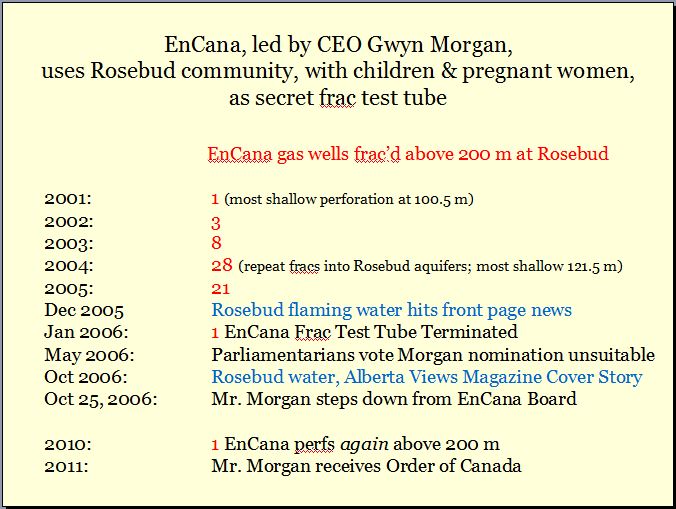
2001: Encana begins a secret experimental shallow fracturing natural gas project arond Rosebud, without consulting with the community or landowners in violation of EUB (now AER) Directive (then Guide) 56.
June 2003: Encana’s first un-attenuated compressor installed about 900 metres from Jessica’s home, without consulting her about it, in violation of Guide 56. The noise was like a jet engine taking off, 24 hours a day, 7 days a week, worse at night and in winter, because noise rises with heat. Encana continues to violate Jessica’s legal right to quiet enjoyment of her home and land. Had Encana complied with the regulator’s Noise Control Directive and consulted with the community, the compressors could have been located where their noise would not amplify off the coulee walls in Rosebud and into the natural amphitheatre on Jessica’s land.
February 14, 2004: Encana perforated and on March 2, 2004 hydraulically fractured directly and secretly into the drinking water aquifers that supplies the Hamlet of Rosebud, the Ernst water well and others.
August 2004: Jessica finds out Encana lied to her and her community about a blanket approval document the company was pressuring area landowners and homeowners to sign. Jessica resigns in writing, from Encana.
January 2005: The Hydrogeological Consultants Ltd. report is completed for Encana with copies submitted to Alberta Environment, affected Rosebud citizens and reportedly the EUB. The report carefully details that Encana fractured the Rosebud drinking water aquifers.
January 2005: The Rosebud Water Tower blows up in an explosion seriously injuring a Wheatland County worker. It was reported that an investigation determined the explosion was apparently caused by “an accumulation of gases.”
March 16, 2005: Ernst letter to Neil McCrank, CEO of the EUB (now AER), sent by lawer Richard Secord with firm Acroyd, Piasta, Roth and Day, LLP:
Our client is currently facing many negative, mostly unmitigated, impacts due to gas development, including Coal Bed Methane (CBM), as listed below:
a negative change to Ms. Ernst’s water well – her taps have begun to wheeze, whistle and sing, and the quality of her ground water has changed;
roads that Ms. Ernst uses and pays taxes to maintain have fallen into terrible states of disrepair due to the massive influx of heavy, speeding petroleum industry traffic;
compressor noise that Ms. Ernst has had to put up with for over a year;
dangerous, speeding and reckless driving by workers on all roads in the counties where Ms. Ernst travels – fatalities have already occurred due to unsafe oil and gas related driving;
trespassers using industry’s lease roads to access private property;
loss of privacy;
loss of quiet enjoyment of Ms. Ernst’s property; receiving consultation from the main proponent in her area (i.e. EnCana) in the form of lies, and repeat misrepresented information;
loss of Ms. Ernst’s time trying to uncover the truth from EnCana about whether CBM is planned for the Rosebud area or not and how EnCana proposes to minimize cumulative impacts and risks to aquifers – time that is not recoverable;
negative visual impacts;
negative environmental impacts;
negative noise impacts;
negative impacts to air quality (e.g. flaring and compression by products – the dust was so bad this past summer that furniture would be covered in dust less than a day after a full house cleaning);
negative impacts to wildlife;
weed problems; and
stress and anxiety because of Ms. Ernst’s inability to get playground signs installed in Rosebud on Highway 840 adjacent to Rosebud’s playground to protect citizens from speeding petroleum related traffic – blanket approval comes first so as to speed up down-spacing applications for industry and the EUB; safety of Alberta’s children is made to wait a year or two and comes last.
Our client is of the view that CBM remains an unknown at this time. In order to protect Alberta and its citizens, it is imperative that CBM is regulated responsibly, slowly and with caution.
November 24, 2005: EUB (then ERCB, now AER) letter by Jim Reid to Ernst, judging Ernst making criminal threats, copied the Royal Canadian Mounted Police without any evidence, no charges laid, no fingerprints taken by the police, no trial, and excluded her and her dangerously contaminated water well from energy regulation.
December 6, 2005: Ernst letter to Jim Reid at the the EUB, requesting clarification of the regulator judging her making criminal threats and banishing her. Ernst sent her letter via xpresspost so it was registered and trackable.
December 13, 2005: Canada Post returns Ernst’s December 6, 2005 letter to Jim Reid, envelop stamped “refused by addressee”
December 13, 2005: On the same day as Ernst gets her letter back from the EUB, refusing even her registered mail, Ernst’s contaminated water is featured on the Front Page of the Edmonton Journal (interview and photos of the explosive water on December 6, 2005). Alberta Environment suggested bacteria were to blame.
February 28, 2006: Minister of Environment Guy Boutilier states in the Legislature that all affected families will be provided safe alternate water deliveries: “now and into the future” and “because this is a very important issue to this family and to many other families that have been impacted, be it by the natural flow or because of what is being asserted relative to what is taking place in the water supply.”
March 3, 2006: Alberta Environment tests the Ernst water well and advises her that they cannot provide her water tanks for their promised alternate safe water delivery because “industry has all the tanks.” Without seeing the results first, Alberta Environment water well tester Al Straus blamed Ernst for the dangerous methane contamination in her water because she does not run cattle and thus does not use enough water. He also advised Ernst there was a serious problems with the water production in her well but refused to include this data in the test results. The Office of the Privacy and Information Commissioner’s Office later (in 2008) advised Ernst that Al Straus threw these data away because of no control on the well.
April 21 2006: Prime Minister Harper nominates Encana’s Gwyn Morgan as first Chairperson of the Public Appointments Commission
June 8, 2006: EUB lawyer Rick McKee interrogates Ernst; tries to get evidence after the fact and bully her into only speaking with the regulator and not the press and asked her what it will take to get her to leave Alberta. Ernst replied she will gladly leave Alberta as soon as the regulator starts to do its job.
December 3, 2007: Ernst statement of claim filed in Drumheller court of Queen’s Bench
December 3, 2008: Legal papers served on the defendants
February 12, 2009: “undercover” Royal Canadian Mounted Police with Canada’s anti-terrorist squad arrive warrant-less at Ernst’s home to interrogate.
October 24, 2009: Prime Minister Harper announces the appointment of Neil Wittmann as new Alberta chief justice of Court of Queen’s Bench
July 19, 2010: US Congress investigates Encana’s fracturing practices and all allegations of water contamination
April 27, 2011: Ernst goes public with her lawsuit
June 24, 2011: Harper Government appoints Barbara Veldhuis to Court of Queen’s Bench
September 10, 2011: POWERSFrackAlberta Workshop with keynote presentations by Andrew Nikiforuk and Jessica Ernst
October 1, 2011: UNANIMA International presents Jessica Ernst with Woman of Courage Award at the UN Church Center in New York City.
April 26, 2012: First hearing in Drumheller Court of Queen’s Bench. Justice Veldhuis requests shorter statement of claim and volunteers as case manager. ERCB lawyer Glenn Solomon demands the original statement of claim is removed from the court and public record. Denied.
October 1, 2012: Defendants demand the case is moved to Calgary during a case management call with Justice Veldhuis (moving the case was not on the agenda).
From the call transcripts, lawyer representing the Alberta Government:
“It clearly tips in favour of the defendants’ position, that it ought to be in Calgary and not in Drumheller.”
Justice Veldhuis advised that according to Chief Justice Wittmann, the case is to be heard in Drumheller.
Encana lawyer advised they will not drive to Drumheller.
The case is subsequently moved to Calgary by Justice Wittmann.
January 18, 2013: Second court hearing, in Calgary. The court room is packed, not enough seats, some attendees were directed to an incorrect room, some left.
Encana did not argue to have the case struck; the company website states that the case has no merit.
February 8, 2013: Harper Government promotes Justice Veldhuis to Alberta Court of Appeal Ruling on arguments Justice Veldhuis heard on the Ernst case “Not an option.”
February 15, 2013: In a case management call with Justice Veldhuis, it was relayed that Alberta Court of Queen’s Bench Neil Wittmann volunteered to take over the case. The other option offered was to allow the three defendants and plaintiff to choose a new judge which would have been a long drawn out, unjust, expensive process for Ernst.
March 5, 2013: University of Lethbridge announces honourary degree for Justice Neil Wittmann
April 13, 2013: Alberta Government appoints Encana/Cenovus/Canadian Association of Petroleum Producers multi-year Executive Gerard Protti to Chair the new Alberta Energy Regulator (100% funded by industry and now controls all of Alberta’s fresh water)
September 19, 2013: Justice Wittmann’s ruling on the hearing he did not hear, gives the ERCB complete immunity, even for violating Ernst’s Canadian Charter of Rights and Freedoms; rules there is no evidence that Ernst is a terrorist; denies the Alberta Government’s attempts to get the word “contamination” removed from the statement of claim, or paragraphs mentioning the other contaminated water wells at Rosebud.
January 13, 2014: Case management call. After three years, Justice Wittmann grants the Alberta government another chance to try to get my case thrown out. Hearing set for April 16, 2014. Case is moved back from Calgary to Drumheller, where by law, the case belongs.
February 3, 2014: Ernst Appeal Factum filed in Alberta Court of Appeals, hearing set for May 8, 2014 in Calgary.
February 18, 2014: Alberta Government files Application to Strike
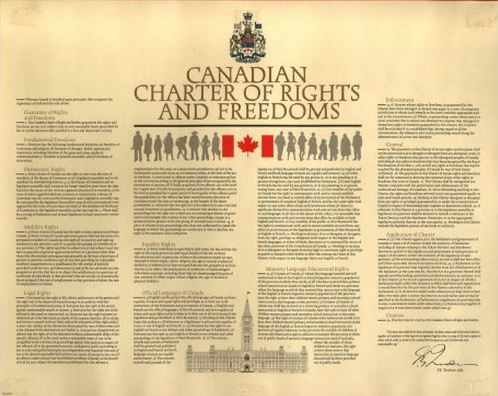
Canadian Charter of Rights and Freedoms
The Canadian Charter of Rights and Freedoms (Charter) was enacted in 1984….the Charter enhances the protections provided to Canadians by increasing the number and the extent of our rights and freedoms. In addition, the Charter now forms part of our Constitution, making it difficult for future governments to decrease or limit the rights and freedoms we currently enjoy. It applies when the government tries to infringe upon the rights of Canadians. …
Because the Charter is part of the constitution, no part of it can be changed by a federal or provincial government. The House of Commons, the Senate, and two thirds of the provinces representing over 50 percent of Canadians must approve any changes to the Charter or any part of the constitution.What is the Canadian Charter of Rights and Freedoms?
It is a document that protects the interests of Canadians and provides a way to challenge perceived abuses of basic rights and freedoms through our court system. … A right is a legal, moral, or social expectation that Canadians are entitled to from the government. For example, a person accused of committing an offence is entitled to a lawyer and a fair trial within a reasonable amount of time. A freedom is a right to live your life without interference from the government unless you impinge on the freedoms of others.
Fundamental Freedoms: Section 2
- Freedom of conscience and religion
- Freedom of thought, belief, and expression
- Freedom of peaceful assembly
- Freedom of association
Rights and freedoms are not without limits. Sometimes they have to be limited in order to protect the rights and freedoms of others. For example, prisoners have some of their rights and freedoms taken away because they have broken the law.
Legal Rights: Section 7-14

Everyone has the right to be secure against unreasonable search and seizure. The police must have reasonable grounds for searching you or your home and any evidence that is unlawfully obtained may be excluded at trial. …
Everyone has the right to a fair trial within a reasonable time.
Everyone is innocent until proven guilty beyond a reasonable doubt. Crown counsel must present evidence to an unbiased judge or jury in an open court to prove the accused’s guilt. The accused does not have to prove anything or call any evidence. … Everyone has the right not to be subjected to any cruel and unusual treatment or punishment. [Emphasis added]
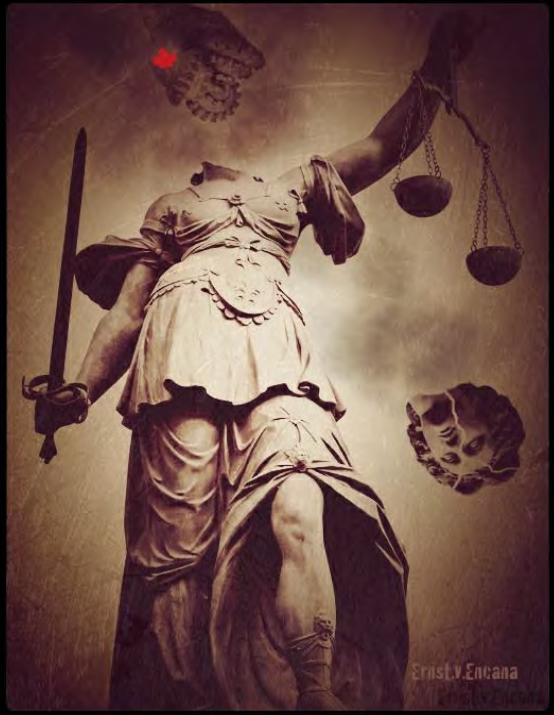
Last slide Ernst presentation, March 2013, UK and Ireland speaking tour

